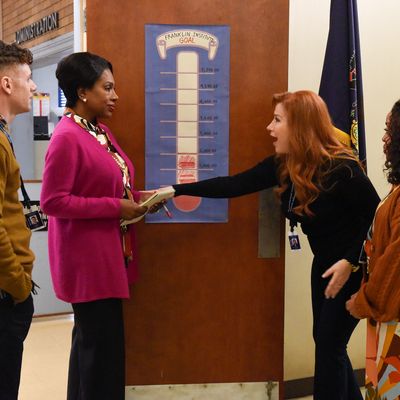
In 2015, The Chicago Tribune reported that not only does the fundraising industry generate $3.3 billion in annual sales, but 94 percent of schools rely on fundraising to supplement the district’s money. To this day, the thought of fundraising always makes me think of the shame I felt as a child having to admit to my mom that I had eaten the candy I was supposed to sell.
But, as Barbara puts it, these types of fundraisers are a necessary evil for many students who attend underfunded schools.
In addition to generating additional funding for their school, fundraising activities can help students sharpen social skills as they hit the streets trying to meet their goals. Although it felt more like an elongated marshmallow experiment I didn’t sign up for, it forced me to learn how to speak publicly with confidence and charisma. Barbara coaches the students to hold their heads up high and always to make strong but respectful eye contact as they collect money for a field trip to the Franklin Institute science museum. Her instructions only go so far, raising the illustrated progress bar millimeter by millimeter, so Ava intervenes with her own selling techniques.
Barbara begrudgingly teams up with Ava, who instills her hustle mentality in the students. Wanna sell some chocolate? Do whatever it takes. Fake sales to get new ones. Avoid giving change because customers “aren’t Sam Cooke, so change is not gone come.” Fabricate an illness because “nobody likes to buy things from happy people.” Go for easy targets: liberal white people. She even brings Jacob in to illustrate how easy it is to exploit white guilt. Barbara is disgusted with Ava’s instruction, reprimanding her for turning the students into little scammers, but Ava stands by her tactics since the proof is in the pudding. They come to a middle ground and agree to leave out the lying and racial profiling.
After the students meet their goal early, Ava suggests they keep going and expand their market to raise even more money, opening the possibility of getting a real librarian to replace the Alexa with glasses. They head to the mall and rack up so many sales Ava declares they could “sell a humid day to a silk press.” Delisha Sloss, the woman Barbara blackmailed into giving Abbott grant money, happens to be at the mall as well, so naturally they try to get her sale. When one of Barbara’s students offers a candy bar for $1, Delisha says that Henry just sold her one for $2, exposing their less-than-ethical salesmanship. Embarrassed, Barbara has no choice but to give Delisha her change and endure the shady comments from her “coworker in Christ.” Ava admits she encouraged the students to overcharge and keep the extra money as commission. Barbara condemns the whole operation and tells Ava she regrets working together.
The contention spills over into the next day, with Barbara giving Ava the cold shoulder. Ava refuses to be treated this way in the school that she “owns” and demands that Barbara air her grievances. Throughout the series, we’ve learned more about Ava’s upbringing and how it informs how she treats the kids. On the surface, she’ll always crack inappropriate jokes and put herself first, but she’s also the person Henry feels comfortable enough to go to when he’s grown out of his pants but knows his family can’t afford to get him new ones. Without any judgment or condescension, she gives him a new pair of pants (from her Avalicious line, of course) that she keeps in her drawer. Part of her motivation in teaching Henry how to finesse is to give him the skills to better his financial situation. She tells Barbara that her hustle mentality is what propelled her from being a kid with circumstances like Henry to the principal of the school and that the only reason Barbara can manage to live by her staunch morals and values is that she can afford to.
I don’t think Barbara will ever fully approve of Ava’s way of thinking, but the principal’s words impact her. She apologizes to Walter for putting him on the spot with Delisha, marking the first time an adult has apologized to Walter. Then she invites him to help with her church bake sale so he can put his sales skills to good use, offering him a 5 percent cut. Forever Ava’s protege, Henry negotiates for 90 percent, but they meet at 10. Ava continues the kindness and vows to be transparent with Barbara whenever she comes up with morally ambiguous ideas … before returning Barbara’s school ID that she stole to get free pancakes as a teacher since principals aren’t eligible.
Mr. Johnson and Jacob are also experiencing discord despite teaming up in the last episode. They take their relationship to the next level and begin co-parenting a stray cat found in a closet at the school. Their parenting styles vastly differ, and the two can’t agree on nap schedules, microchipping, and lactose intolerance, turning into caricatures of a helicopter parent and an easy-going, fun parent. The fighting comes to a head when Melissa sits the two down for some necessary conflict resolution. They agree that the cat will live with Jacob in his stable, two-parent household full time but will stay every other weekend at Mr. Johnson’s “geriatric bachelor pad” (Jacob’s words, not mine). The harmony is short lived, as fourth-grader Brianne starts to pass out flyers featuring a picture of Milton, who has been missing since she brought him in for show and tell. They give him back, obviously, but Mr. Johnson grieves his dream of driving off into the sunset, just the three of them, never looking back.
The real people who should be driving off into the sunset are Janine and Gregory. Finally their storyline progresses past their Disney Channel grind before winter break. Maurice and Janine have continued their flirtationship via text, but things move to the next level once Maurice shows up at the school, buys some chocolate from a student to butter her up, and then asks Janine out on a date. Gregory warns Janine that Maurice can be intense, saying that he doesn’t want any blowback on him if things don’t end well. But Janine promises he doesn’t have to worry about “any back getting blown,” creating a sufficiently awkward ending to an even more awkward conversation.
Janine is smitten by Maurice and gushes about their pending date in the teacher’s lounge. He’s kind of corny to me — he texts her pictures of white celebrities who look alike and sends voice memos of him laughing instead of saying “lol” like a normal person — but that’s right up Janine’s alley. He’s definitely a player, as seen by his treatment of the students before he found out Janine was in charge, and his disingenuous charm is working on Janine. Gregory is jealous of their courtship and, to everyone’s confusion, immediately tries to buy chocolate from Janine after hearing her rhapsodizing about Maurice. Noting that Gregory could’ve bought candy from his own students, and that he doesn’t even like candy in the first place, Jacob senses something up with his behavior. He finally asks Gregory out loud the question we all know the answer to: does he like Janine? Gregory’s flustered reaction and deflection of the question give Jacob all the information he needs.
By the end of the episode, Gregory gives Janine his blessing for her date with Maurice, probably knowing that if he’s not going to fess up to his true feelings, it’s only fair to let her live her life. He does leave her with some advice, though, and suggests not ordering ribs as he’s seen her eat them before, and it gets “aggressive.” She ignores this advice and shamelessly demolishes messy ribs as Maurice opens up about his childhood trauma. With sauce all over her face, she passes on the napkin Maurice offers and scarfs down the rest of her meal, proving Gregory knows her like the back of his hand.
Teacher’s Notes
• Okay, the little kindergartener with braids is the sweetest little cutie pie. He’s got amazing child-actor potential, and he stole the show for me with his line delivery about pinching his cheeks and when he poked his own eyes during Ava’s training.
• Something I love about Abbott Elementary is its constant humanization of children. Walter saying that an adult had never apologized to him is one of the many examples of how the show continues to give children agency, respect, and care. These things aren’t always allotted to them in our society. Children are not our property or subordinates — they are human beings who deserve to be treated as such.
Last but never least, here are some of the greatest lines of the episode:
• Courtney, after Jacob says he’s a white progressive, not a liberal: “Is there a difference?” Amen, sis.
• Barbara responding to a student saying he’ll say “suck it, Boomer,” to those who decline the chocolate: “I don’t know who boomer is, but what we say is ‘thank you for your time.’”
• Ava: “We sold out faster than a Black politician.”
• Mr. Johnson, when Jacob says cats are pescatarian: “You’re telling me this cat believes in God?”
• Henry, beginning his sales pitch to Ava: “Excuse me, sir, ma’am, or otherwise identifying human.”
• Ava: “She’s still using the tactics of a man who could turn water into wine and still only have 12 friends.”


